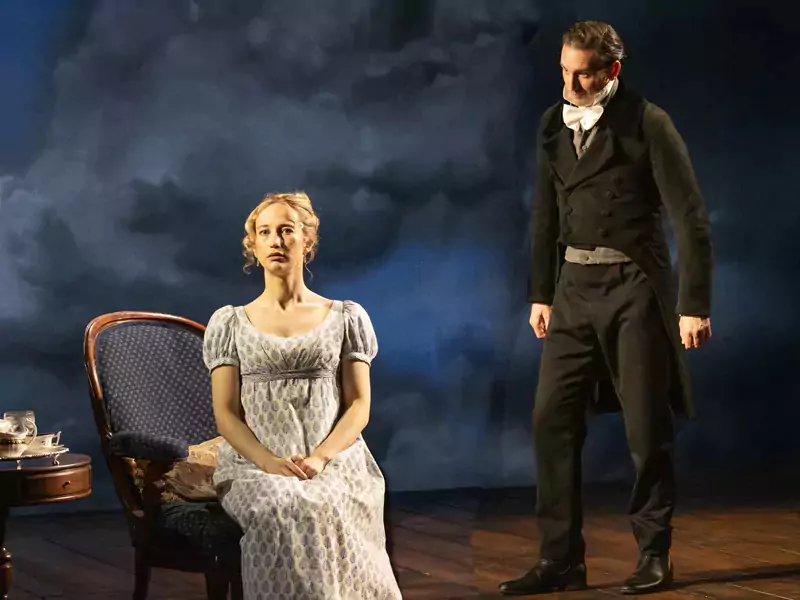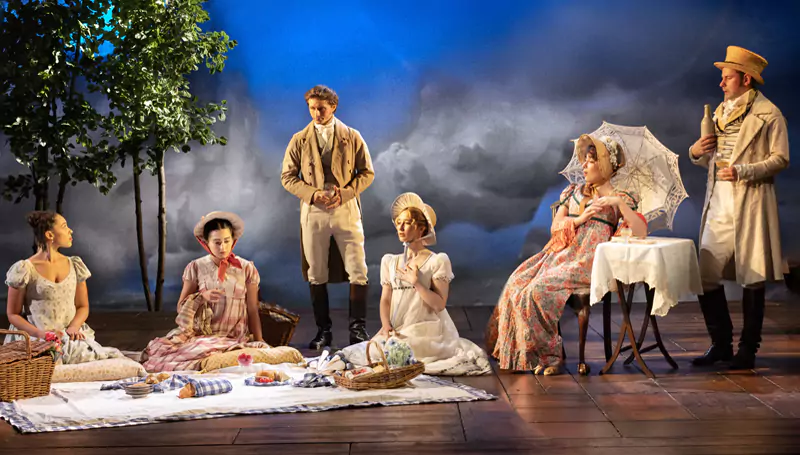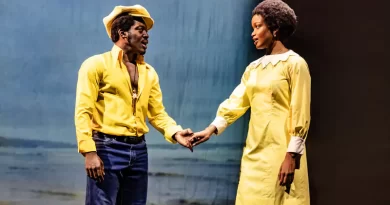“Emma” at Theatre Royal Bath
Simon Thomas in South West England
18 September 2025
★★★
While they have been adapted for both the big and small screen – arguably a little too often – Jane Austen’s novels rarely make it to the stage. In this year of celebration of 250 years since her birth, however, two regional theatres are simultaneously launching adaptations of Emma, the last of her books published in her lifetime. The Rose Theatre, Kingston is promoting its offering as a “reimagining” of the story set in the 21st century, while Bath’s Theatre Royal plays it completely straight, in a city that features in several of Austen’s works.

Ed Sayer and India Shaw-Smith.
Photo credit: Simon Annand.
Linking the two venues is the director of Bath’s production Stephen Unwin, former artistic director of the Rose, whose approach is elegant and slick, the emphasis on regency romance and non-ironic comedy (there have been a number of parody shows of Austen’s work in recent years). There’s little trace of social commentary on the mores of Austen’s time and her subtle portrayal of the gradations of status in early 19th-century society. A staging of a Jane Austen novel is never going to be the most searching of dramas but it could reflect the seriousness underlying the frippery more than this lightest of period-drama soufflés.
Emma is the story of a spoiled young woman of fair means who laces her idle life with romantic intrigues and selfishly motivated meddling. Her lack of self-reflection and instinct for interfering matchmaking have far-reaching effects for those unlucky enough to get caught up in her scheming. She all but ruins the chances of true love for her protégée, the impoverished Harriet Smith, and turns on her when her own interests are threatened. This could make for a thoroughly unlikeable character and part of Austen’s skill was her ability to maintain the reader’s sympathy, something that Unwin’s production also does.
Ryan Craig’s adaptation to the stage is deft, as was his version of Orwell’s 1984 in Bath a year ago. There’s a slight clumsiness about the rounding up of the various couplings towards the end but it’s easy to underestimate how difficult that is to achieve without the aid of narration. As with the Orwell adaptation, he contracts various strands of the story into a neat narrative, dispensing with the character of Miss Bates, for instance, and making Harriet the object of Emma’s spiteful derision at the Box Hill picnic.
India Shaw-Smith leads the cast skilfully in a portrayal of Emma that shows she may be only a few years away from becoming an outright martinet. One can imagine her, if she were to maintain her avowal never to marry, as a stern headmistress hated by pupils and colleagues alike. That she manages to convince us there’s a sweet nature worthy of romantic love beneath the harsh exterior is to her credit.
Ed Sayer is an upright Mr Knightley, his nobility and compassion tempered by an air of fallibility, with a tendency of his own to interfere in the affairs of others. It makes him a believable match for the heroine and his self-forgiveness helps us also accept Emma’s all-too-human failings. As the gormless object of her machinations, Maiya Louise Thapar’s Harriet marks an impressive professional stage debut. I recently saw Thapar in her final show at Bristol Old Vic Theatre School, as the earnest photographer in Abi Morgan’s Splendour, and she is equally good here, although she perhaps overdoes the gawkiness a little. William Chubb scores a hit as Mr Woodhouse, wrapped up in his own needs which threaten to curb the happiness of his daughter, and he garners many of the night’s laughs.
There are also strong supporting performances from Oscar Batterham (Mr Elton), Jade Kennedy (Jane Fairfax), Peter Losasso (Frank Churchill), and Rose Quentin (the odious Mrs Elton). Ceci Calf’s simple set designs fluently combine internal and external settings with the greatest of ease and her regency costumes are ravishing.
Following the Bath run, the production tours to Guildford, Birmingham, Sheffield, Malvern, Oxford, and Poole, and will no doubt leave a trail of good feeling in its wake. This is Jane Austen lite: it won’t challenge anyone’s perceptions of her writings, but plays perfectly to audiences who want to see safe TV period drama successfully transferred to the stage.









